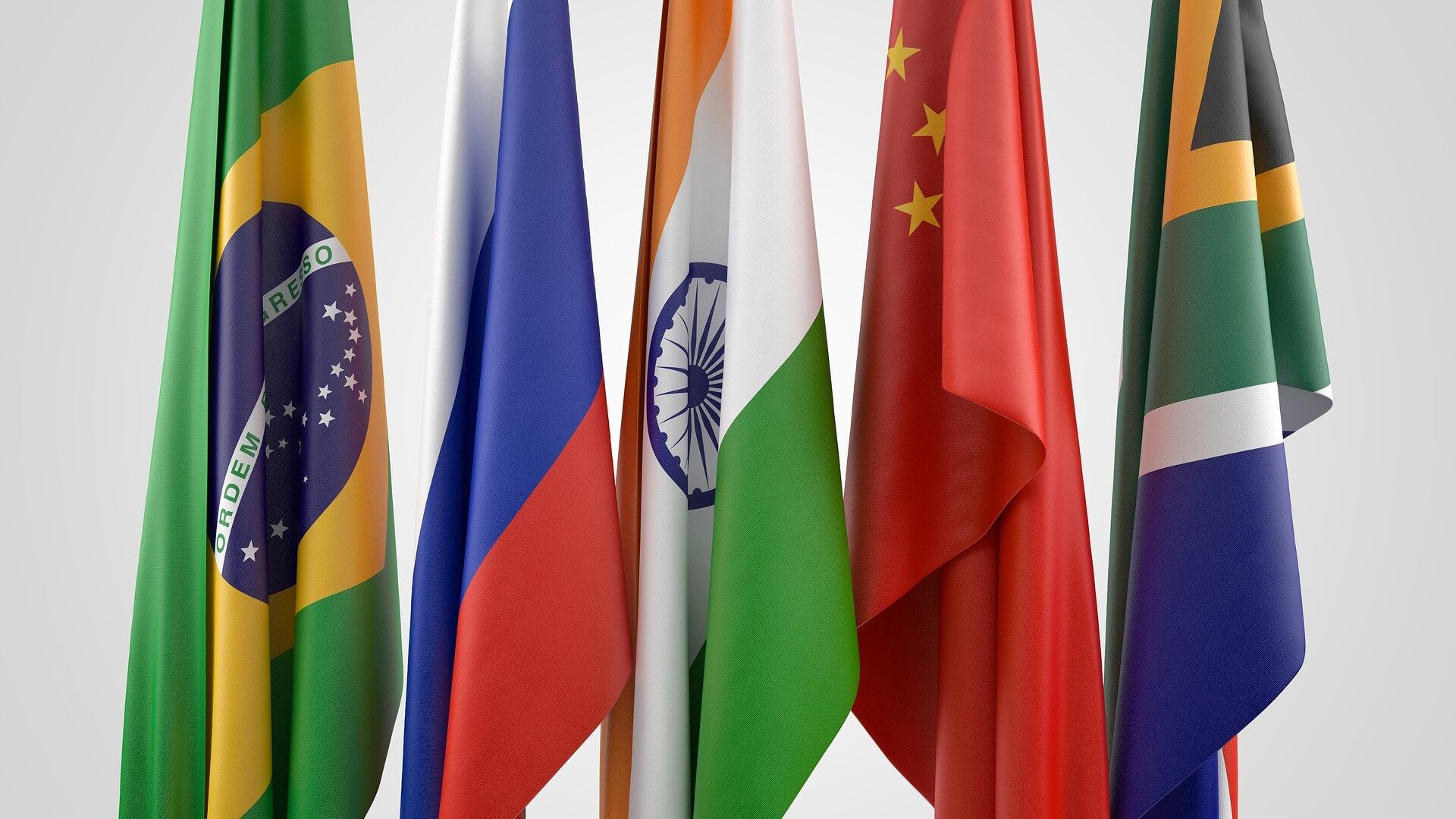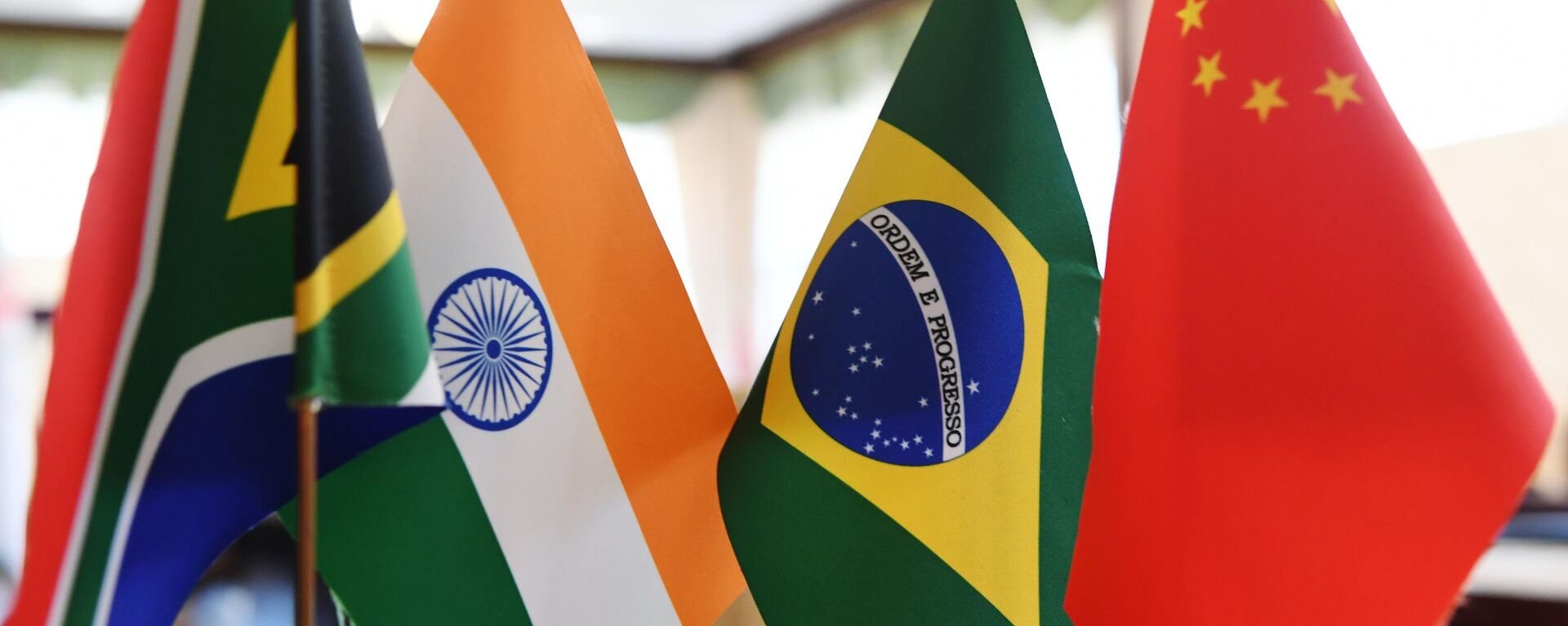https://en.sputniknews.africa/20230414/unilateral-sanctions-against-russia-have-no-effect-on-cooperation-within-brics-1058602241.html
SA Sherpa: Unilateral Sanctions Against Russia Have No Effect on BRICS Cooperation
SA Sherpa: Unilateral Sanctions Against Russia Have No Effect on BRICS Cooperation
Sputnik Africa
South Africa doesn't recognize unilateral sanctions imposed against Russia, and is willing to expand relations with the country in many fields of mutual interest, said Anil Sooklal, an ambassador-at-large for Asia and BRICS.
2023-04-14T13:19+0200
2023-04-14T13:19+0200
2023-04-15T09:44+0200
opinion
southern africa
south africa
energy
brics
brics expansion
brics summit
cooperation
africa insight
energy crisis
https://cdn1.img.sputniknews.africa/img/103734/46/1037344642_0:100:1921:1180_1920x0_80_0_0_3e3ec70e2b52453a2b7a4f70881e53ec.jpg
South Africa doesn't recognize unilateral sanctions imposed against Russia and is willing to expand relations with the country in many fields of mutual interest, said Anil Sooklal, a South African ambassador-at-large for Asia and a BRICS’ sherpa, in an interview with Sputnik.Sooklal, who is also South Africa's BRICS sherpa, noted that the nation recognizes only UN approved sanctions, underlining that there is no this kind of sanctions against Russia.He underlined that these unilateral sanctions against Russia don't affect the functioning of BRICS, as well as not having any influence on the relationship between South Africa and Russia.SA's Priority is Advancement of Continent's DevelopmentAs South Africa is the 2023 BRICS chair, he explained that the focus would be on promotion of African needs and agenda on the international arena. Sooklal stated that the country wants to further strengthen the partnership between BRICS and Africa, an intention which started during South Africa's first chairship in 2013 and continued during the second in 2018.He outlined several spheres, which are expected to be major areas of cooperation between the BRICS group and African countries, including trade, energy and female empowerment.As for trade, he noted, it's particularly important, given the recent launch of the African Continental Free Trade Area (AfCFTA). South Africa is going to use its chairship to see how the BRICS works with Africa in advancing the opportunities that the free trade agreement presents in terms of strengthening trade relations and ensuring that the countries take full advantage of it.Another focus area for cooperation between the BRICS and African states, according to Sooklal, lies within the energy sector, while the third is specifically focused on women and providing opportunities for female entrepreneurs both within the group and Africa.Energy Cooperation for Mutual BenefitTalking about cooperation in the energy sector, the diplomat highlighted that energy security has always been a priority for all of the five BRICS countries. The group has "a very ambitious energy roadmap" that, among other things, provides for a just energy transition. He underlined that even though the member states agreed on moving towards renewables, they also decided to make it just, with no harm to any state in terms of socio-economic development.He also noted that the group is planning to establish a BRICS African Center of Excellence on the Just Energy Transition. According to him, it is expected to be a platform for enhancing research between the countries' researchers and energy institutes, as well as for a joint search for solutions to various challenges, and for sharing experiences and best practices. The main intention is to have a center, where everyone who is interested can be a party and where countries can contribute collectively to ensuring global energy security.He underscored that it is necessary that the countries, the BRICS members and African nations as well, are independent from the "Common West in terms of energy needs." To achieve this, the BRICS countries need to invest more in joint energy research and technology, and be able to draw on their own expertise, scientific and research community.Among other things, Sooklal also touched upon the topic of the current energy crisis in South Africa, noting that the partners from the BRICS could help the nation in addressing this issue by sharing their experience. In particular, he noted, the country's newly appointed Electricity Minister is now in talks with the partners in terms of finding best ways of "how we could draw on assistance from the BRICS countries in assisting us overcome this challenge."In particular, he drew an example of cooperation in energy between South Africa and Russia, stating that Rosatom is now having discussions with the country in terms of providing assistance to resolve the energy crisis. The Russian company, the diplomat noted, already has an agreement with South Africa to construct small hydropower plants.
https://en.sputniknews.africa/20230407/1058514656.html
southern africa
south africa
Sputnik Africa
feedback@sputniknews.com
+74956456601
MIA „Rossiya Segodnya“
2023
News
en_EN
Sputnik Africa
feedback@sputniknews.com
+74956456601
MIA „Rossiya Segodnya“
Sputnik Africa
feedback@sputniknews.com
+74956456601
MIA „Rossiya Segodnya“
brics, south africa, southern africa, cooperation, unilateral sanctions
brics, south africa, southern africa, cooperation, unilateral sanctions
SA Sherpa: Unilateral Sanctions Against Russia Have No Effect on BRICS Cooperation
13:19 14.04.2023 (Updated: 09:44 15.04.2023) Exclusive
Since the beginning of the Russian special military operation in Ukraine, Moscow has been subjected to various forms of economic and political sanctions introduced by the US, EU and some other Western countries. However, despite these restrictions, Russia continues to enhance its cooperation with numerous states across the world.
South Africa doesn't recognize unilateral sanctions imposed against Russia and is willing to expand relations with the country in many fields of mutual interest, said Anil Sooklal, a South African ambassador-at-large for Asia and a BRICS’ sherpa, in an interview with Sputnik.
"We do not recognize unilateral sanctions. We only recognize UN-approved sanctions. So there are no UN sanctions against Russia," he said.
Sooklal, who is also South Africa's BRICS sherpa, noted that the nation recognizes only UN approved sanctions, underlining that there is no this kind of sanctions against Russia.
"We have a strong relationship with Russia and we continue to strengthen that relationship, including cooperation, as I said, within BRICS and also bilaterally," the diplomat stated.
He underlined that these unilateral sanctions against Russia don't affect the functioning of BRICS, as well as not having any influence on the relationship between South Africa and Russia.
SA's Priority is Advancement of Continent's Development
As South Africa is the 2023 BRICS chair, he explained that the focus would be
on promotion of African needs and agenda on the international arena. Sooklal stated that the country wants to further strengthen the partnership between BRICS and Africa, an intention which started during South Africa's first chairship in 2013 and continued during the second in 2018.
He outlined several spheres, which are expected to be major areas of cooperation between the BRICS group and African countries, including trade, energy and female empowerment.
As for trade, he noted, it's particularly important, given the recent launch of the African Continental Free Trade Area (AfCFTA). South Africa is going to use its chairship to see how the BRICS works with Africa in advancing the opportunities that the free trade agreement presents in terms of strengthening trade relations and ensuring that the countries take full advantage of it.
Another focus area for cooperation between the BRICS and African states, according to Sooklal, lies within the energy sector, while the third is specifically focused on women and providing opportunities for female entrepreneurs both within the group and Africa.
Energy Cooperation for Mutual Benefit
Talking about cooperation in the energy sector, the diplomat highlighted that energy security has always been a priority for all of
the five BRICS countries. The group has "a very ambitious energy roadmap" that, among other things, provides for a just energy transition. He underlined that even though the member states agreed on moving towards renewables, they also decided to make it just, with no harm to any state in terms of socio-economic development.
"We collectively agreed that it must be a just energy transition that does not hamper our economic growth, that does not contribute further to unemployment and job losses," Sooklal explained.
He also noted that the group is planning to establish a BRICS African Center of Excellence on the Just Energy Transition. According to him, it is expected to be a platform for enhancing research between the countries' researchers and energy institutes, as well as for a joint search for solutions to various challenges, and for sharing experiences and best practices. The main intention is to have a center, where everyone who is interested can be a party and where countries can contribute collectively to ensuring global energy security.
He underscored that it is necessary that the countries, the BRICS members and African nations as well, are independent from the "Common West in terms of energy needs." To achieve this, the BRICS countries need to invest more in joint energy research and technology, and be able to draw on their own expertise, scientific and research community.
"So in terms of transiting to clean energy, it must be done at a pace determined by ourselves and not forced upon us by the Common West, who all grew their economies on fossil fuels," South Africa's sherpa stressed.
Among other things, Sooklal also touched upon the topic of the current energy crisis in South Africa, noting that the partners from the BRICS could help the nation in addressing this issue by sharing their experience. In particular, he noted, the country's newly appointed Electricity Minister is now in talks with the partners in terms of finding best ways of "how we could draw on assistance from the BRICS countries in assisting us overcome this challenge."
In particular, he drew an example of cooperation in energy between South Africa and Russia, stating that Rosatom is now having discussions with the country in terms of providing assistance to resolve the energy crisis. The Russian company, the diplomat noted, already has an agreement with South Africa to construct small hydropower plants.


